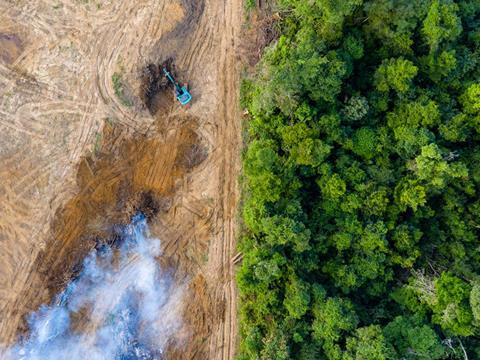
Last week at COP26 more than 100 countries made a pledge to halt and reverse deforestation by 2030. In this article, Asger Olesen, Chief Climate and Ecosystem Services Officer at the Forest Stewardship Council (FSC), gives the view of his organization on this announcement.
The Forest Stewardship Council welcomes the Declaration issued by 105 countries at the Glasgow CoP26 meeting, stating their commitment to work together to halt and reverse the loss and degradation of the world’s forests by 2030.
The focus on protection and sustainable management of forests is imperative in any solution to the world’s climate crisis. Without increased efforts to protect forests, it will not be possible to meet the ambition of the Paris Agreement to hold the increase in the global average temperature to below 2°C.
The Declaration, though not the first of its kind, has seen a higher majority of countries endorsing it than any previous attempts, including those areas most at risk of deforestation and dependent on the economic value of the forest industry.
Deforestation is driven by unsustainable demand for commodities by consumers, in addition to financing communities and governments in tropical countries. This pledge should help drive action to guide and change consumer preferences, through increased certification of territories, improved data and tools, market and import preference strategy, and the swift adoption of EU Sustainable Finance Taxonomy.
Countries that signed the declaration have committed to working together to build resilience and enhance rural livelihoods by empowering communities and recognising the rights of Indigenous Peoples - crucial elements of any successful forest initiative. Forest protection and sustainable forest management must now become a central part of all efforts to combat climate change.
FSC certification of forests does not stop with the forest itself, FSC has long recognized the importance of timber product supply chains and the vital importance of production and packaging companies in supporting the sustainability of forest management.
An FSC logo on a product means that actors across the supply chain behind that product –from forest to retail - comply with all international environmental and social standards set by the FSC system including no deforestation.
Consumers have now listed climate change as their second most important global worry, according to research conducted by GlobeScan for FSC in 2021 which involved 12,000 participants across 15 countries. The results confirmed that sustainability concerns increasingly influence shopping choices, with more than 80% of shoppers saying they expect companies to ensure their wood and paper products do not contribute to deforestation.
There is an increasing role for ecolabels and measures within the packaging industry in supporting the COP26 declaration. FSC presence on products significantly influences the buying choices of consumers by demonstrating the sustainable sourcing of the product and/or the package that it arrives in.
By becoming a certified chain of custody organisation, companies ensure that the products they use from the forest are not leading to its destruction, but to their long-term protection. FSC stands ready to work with governments, businesses, Indigenous Peoples, and interested stakeholders to help meet the ambition of the Declaration.













